Something Different The painful, necesarry practice of anti-blogging
I am a person with contradicting feelings – bright joy and biting pain, warm contentment and rattling loneliness – you know, I’m fully human like you. I have opinions, ideas, beliefs, thoughts that change and contradict; I want to write about all of these here.
But this is not a blog. No.
As much as it hurts me to say it: I don’t want this place to be another conveyor belt of pretend thoughtful conversation organized by tags and time-stamped to show that it’s “fresh” and “new.” No matter the intentions, the internet has shown itself to be a terrible place for real, thoughtful conversation. Maybe. I don’t know. But I haven’t seen much good from it. So I’ll write in the most clear and not-overly-wordy way I know how; even when I want to talk about the deeper, brainy things, I will try to be clear.
I am breaking the system?

The System Breaker, wielding his mighty Hammer of Ego… Er… I mean Justice.
Well to be fair, it’s broken already. Let’s say I am turning it upside down, maybe, in a way. And to be blunt, it’s painful to me. I crave feedback, interaction. My gut says I need these things. And I do. But I know full well the internet doesn’t give feedback to anyone in a real way.
Author Alan Jacobs has his own take on this; what he calls the “blogoshpere.” He says:
… Right now, and for the foreseeable future, the blogosphere is the friend of information but the enemy of thought. – Alan Jacobs, Goodbye Blog
I find Jacobs’ thoughts here to be revolutionary. Blogs, no matter what they are about, are great to transmit facts. Need a good chicken and dumplings recipe? Go to a food blog. Sure, you’ll have a million food blogs from which to choose, and most are just sharing the same chicken and dumplings recipe wrapped in their own blog’s frame. But the second someone “blogs” about something deep, about their opinion on this or that, and they invite others to respond and “share,” that’s the moment they negate themselves and their own intentions collapse in on themselves. Interesting that I am attempting to respond and reason in a way to Jacobs’ thoughts that would be similar to a blog comment – but the difference is I don’t ask for anything in return.
I don’t want your letters, your emails, comments, likes or tweets.
What I want is for you to think.
This is what I call anti-blogging. Clever, right? My thoughts that I write here are, in a way, my comments on the blog of everything. The blog of me waking every morning hoping against all evidence to the contrary that this life means something, and that the words I am terribly typing (thank God for spellcheck) into this website have meaning beyond the pixels that are being displayed on my screen. I think about the absurdity of existence and how I am even able to make observations about anything or even write them down – whether you consider them meaningful or not.
I just want you to know; be an observer; see what fits and what doesn’t. Then I want you to just move on with it all in mind. Let it bounce around in your brain. Whatever you do with my thoughts is no matter, I just want to tell what it feels like to be who I am. And who am I anyway? Who are you? Let’s ask the questions together and live the questions together.

“…the lonely world within myself…”
I hope in some way to mold this “enemy of thought” into something more like a signpost of “what-do-you-call-it?” A place to try and name the unnameable of the lonely world within myself, and by extension, the lonely world within you. Maybe you’ll find you feel the same about a lot of what I say here. Maybe not. No matter, I’m trying to escape by choosing not to escape. I want this to be a place where anyone can come by and stretch their mind open to catch whatever stupid things I have to say, because there isn’t any sort of pressure to agree or disagree. Because maybe the stupid emptiness in me is, in a lot of ways, just like the stupid emptiness in you. Stupid because of its unmovable nature; stupid because it is most certainly not inescapable emptiness.
Nevertheless, I hope in your mind you always do a dance of agreeing and disagreeing.
Like a cardio workout for your brain, it keeps you healthy. So here, now: just read. Digest and “comment” on all of this by bringing it into the battle fought moment by moment inside the lonely world within yourself.
Private Hell The innter emptiness I journey further into with every choice
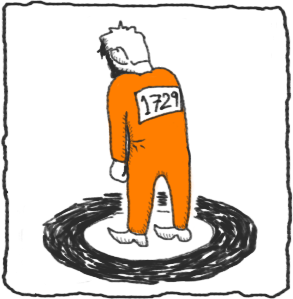 In what hell have I steeped myself? Like a strong tea, with twisting and turning leaves bleeding out underwater, in heat above the boiling point. The truth is, I seem to be in the process of taking the scalding dip. And I’ve seen where it ends. It is a submersion that will one day find me dressed in an orange jumpsuit, known only by a cold number, which means I’m not really known but cataloged, herded, caged. A submersion that will find me staring down one of the members of my cell block, who has punched me in the mouth for no reason other than the frustration and existential furnace of the hell we both find ourselves. Hell, I mean, as exactly what hell is: a wasteland of the self. Isolation within ourselves – sharp loneliness and rattling emptiness, forever.
In what hell have I steeped myself? Like a strong tea, with twisting and turning leaves bleeding out underwater, in heat above the boiling point. The truth is, I seem to be in the process of taking the scalding dip. And I’ve seen where it ends. It is a submersion that will one day find me dressed in an orange jumpsuit, known only by a cold number, which means I’m not really known but cataloged, herded, caged. A submersion that will find me staring down one of the members of my cell block, who has punched me in the mouth for no reason other than the frustration and existential furnace of the hell we both find ourselves. Hell, I mean, as exactly what hell is: a wasteland of the self. Isolation within ourselves – sharp loneliness and rattling emptiness, forever.
Where am I in this journey?
Am I spinning out in the dry desert air, burning away with every increasing rotation? I am. Or at least it feels that way more times than I’d like to admit. And even harder to admit: I am in love with it, like I’m in love with a happy key scratch on the car of the person who cut me off on the road. I love it because I feel it’s all I know or will ever know. It’s all that makes sense, because there is no purpose to the whole thing. Right?
The reality I’m desperate to embrace is one where I can look at other human beings as objects. Where I can consume flesh with my eyes, like eating full plates of food on a full stomach. The selfish indulgence, the burning emptiness in the fullness.
And spinning out of control in the empty air of life, I reason that all I can do is love my own destruction. I attempt reason, despite my hopeless state – but do I reason far enough? The process is at best unconscious and at worst intentional and wholehearted. Truthfully, it’s intentional long enough to cause it to become unconscious; so, at best and worst, it’s both.
Here I write in part to raise something else toward my own reasoning: it is possible to escape this terminal inertia, this vast emptiness expanding inward, forever. There is another way, a way out. But not some triumph of the self. Not some heroic rise and increase of power. That seems like it would be right, doesn’t it? But no. That simply puts a gloss over the cover, the vast emptiness expanding inward still goes on, despite all effort to the contrary.
Why?
Because the hell I am steeped in is my own doing, and won’t necessarily lead to a literal orange jumpsuit, a cold number to replace my name. It will lead to imprisonment in the daily sighs, the ache that pounds at my stomach as I look for the next high – the next thing to serve me and to numb me more to real reason. Reason that acknowledges a foundation. Reason that acknowledges my contradicting choices; why I think I’m free but still feel so judged. I am choosing the orange jumpsuit, choosing the number that is slowly overriding my name, letter by letter. But I don’t have to choose this. But oh, left to myself, my deep love for my own end will be exactly this: the end of me as a walking corpse lumbering through empty hell all my life, or as literal ashes sprinkled over the ocean.
I need a greater love to counter my self-inflicted poison. I need a one much greater to affirm me and steal me from the furnace. The furnace I superheat with my own empty intentions, whether I want to see it or not; whether it’s escape attempts or indulgences in further emptiness. And this affirming one cannot be another who is dying and loving it – I need someone who has faced this death – the empty, lonely hell of cosmic separation – and risen above. I need one who has not just walked out into the empty plane of hell, but one who did the impossible and walked through it, emerging on the other side.
I need to acknowledge my inability to escape my private hell – or it will be all I know. I need to admit that all attempts are stupid, because I will sabotage myself with my own contradicting wants and needs. I need to own the fact that I am scared, without someone to pull me out of the big empty – I am scared to death.
I am scared to death when I put the weight of my existence on something that will die.
Holy, Desolate Accepting loneliness and brokenness as part of me, and us all
I am away. I am apart.
It’s a weird mindset that I can only truly get into when I’m away from what I call home. For me it was first felt, full weight, when I was sent away to camp as a kid. It was not until the night pressed hard against me that I felt the vastness of the emotion; the realization.
Even as a kid I knew there was something more going on than: I miss mom, or I miss blankie. Those are the concrete terms. The icons of a privileged childhood. No, my mind didn’t settle for that.
I wish I had known the significance then, I wish it could have changed how I was then – at that moment. But I needed to feel it more than a thousand times more before I could enter into the feeling like finding a single, unfinished birch door set against a starless horizon.
Yet, I felt it – there – so many years ago, full weight.
And I guess the blame was due in part to the comically tragic camp I was sent to. The tragedy was the humanness and downright shabbiness of the whole camp. The comedy was that it claimed the name of Jesus – Lord and Savior; King and Priest. Not that I was turned off to Jesus by the camp. No, if anything it was the great meeting of tragedy and comedy that stirred in my heart the revelation.
I am away. I am apart.
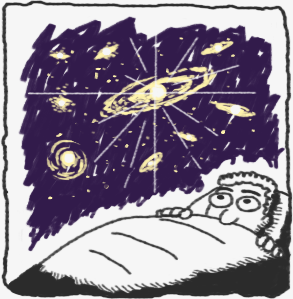 The crickets chirruped in an endless dirge outside the window. And I stared up at the ceiling. At the intensity of my stare the cedar paneling above gave way, and each chip of wood burst into dazzling white and became a solar system. Billions of burning, spinning, empty nothings stretched vast above me. The vastness of the cedar expanse spoke like music to the vastness of the expanse within me.
The crickets chirruped in an endless dirge outside the window. And I stared up at the ceiling. At the intensity of my stare the cedar paneling above gave way, and each chip of wood burst into dazzling white and became a solar system. Billions of burning, spinning, empty nothings stretched vast above me. The vastness of the cedar expanse spoke like music to the vastness of the expanse within me.
And so I knew, even as a kid: I am away. I am apart. Not just here; everywhere.
I was and am a vastness separate and yet connected with the uncomfortable bunk bed I was lying on; with the flimsy chair I sit in now. At that moment at a painfully underfunded, evangelical camp I caught a glimpse of a truth so sharp and deep, it put my body on pins and needles. A real bildungsroman moment; a sharp knife of spiritual reality crashing loudly, silently into my consciousness. A sharpness not matched by the words of any counselor or preacher.
Had you seen me lying on that bunk bed, wrapped in my stained sleeping bag, you would not have even guessed the wide-eyed kid staring at the ceiling was traveling through space and time. In reality I was a kid at camp, missing home, staring at a poorly-constructed cabin ceiling. No mystical light was surrounding me; no trumpets were sounding from the heavens. It was just me, silent; in my lonely world. It was me living deep within my inner lostness, beyond any preached words. And that is what put my soul in the birth pains of the realization.
I am holy, desolate.
Holy: I am a kid wandering in an open, cosmic field. Apart from all others by my very nature.
Desolate: I am an open cosmic field that is broken and decaying with every defiant breath.
And so is every other person I know. We are these things together and separate. Inseparably separate.
But this deep sight was only momentary for my growing mind. And in my simple child way, its revelation came to the surface of my life as anger; as mistrust of others. As a feeling of incurable loneliness and hatred. I couldn’t see how this loneliness and brokenness was actually the connecting tissue between me and every other person in all of humanity. I couldn’t stay, and be present in who I was and who all those around me were.
Instead, I ran.
I felt that if only I could escape or negate the lost inner me, I’d be cured. I’d be better. I’d be over the sickness that it appeared no one else was suffering from. “It,” that terrible, stupid “it.” The “it” that was felt in that second of realization: that this is life, and there is so much more, but I can’t get a hold of “it.”
There it came up from the depths of me like a confusing mass of nothingness. I hadn’t entered into the realization of how connected I really was to everyone and everything. I avoided it as if it were a deadly vapor that would kill me if I so much as took a breath near it. I hated it. Even though it was a tall door set before me beckoning. I avoided. It would be a stupidity that would paint my life for years – and to be honest, the same stupidity is still the undertones of most of my days.
But now, I am growing into acceptance. Accepting, and being willing to admit that I am set apart and broken – just as every person who has graced this planet was and is.
Now that same realization which set my spine afire sets my mind at ease.
The strangest ease. Because I have not arrived by any means. But it’s an ease of knowing that these two opposing things are what make me. My loneliness and all the brokenness is not something to be cured, but to be lived out of. Like the shabby camp and the name of Jesus. I am holy and hidden within myself, but still so unforgivably human it hurts. And that is more than okay, that is how it is. That is precisely how I am connected to others. It’s the same for everyone, whether they see it or not. That is how I can live out of my brokenness and speak from it into your brokenness, because you are in the same boat as me.
Trust me, it is something that can set you at ease, this acceptance of our collective and individual brokenness. That is where we can see a path toward healing, a path toward wholeness. The hope that is so close you can taste it, taste the cosmic ease. And not just an ease free of all tension, but one that revels in the tension of our lost-and-found selves.
I had to meet the Nameless Shadow.
Let me explain. I like to look at this cosmic ease like finding shadows in a vast, burning desert. There are many separate shadows produced by the dense, burning pillars of holiness and desolation. The intersection of their most prominent shadow is where I now sit to cool myself.
I have a name for the shadow; it has only one. You know the name too – but to say it aloud is to bring about the same comedy and tragedy of a painfully underfunded, mediocre camp for children, trying as best it can to lift up and sell the name that needs not be sold. Convinced it is the number of times you are herded into a small chapel building and preached at that does it. But that is not where the shadow is met. It is rather the connection with others, the realization of our shared broken, holy state. Me speaking into your brokenness, and you speaking into mine. Us, as children, wandering in a cosmic field together. That’s where the shadow, this Nameless Shadow, is met.
The Nameless Shadow is in all forms the same as us, yet it is so beyond us. It’s an entity that has traversed the wilderness of that nanosecond of realization – the “it” that I can’t get, has been gotten in that shadow.
I am holy, desolate. The Nameless Shadow is in between the two, transcendent yet present. Lord and Savior; King and Priest.
It is in that shadow I sit – in that dividing comma I rest – drinking in the cold darkness that is now to me the most brilliant and replenishing light. This is the same light every separate solar system shares. And we, in all our holy, desolate humanness can share in the same healing, renewing light together.
Because this all ends The empty comfort of words versus real comfort
Love fiercely.
Because this all ends.

A Sophisticated New Yorker, holding his Holy Icons of Coffee and Inter-connectivity.
I saw these words written in a low-quality jpg image, shared on Facebook. Shared by someone who, I would say, considers himself a sophisticated New Yorker. A person seeking an “optimal state of being,” as long as it has nothing to do with religion, Jesus, or any of that nonsense he saw his mother meddling with, to no good end, in his formative years.
The words struck me for two major reasons. Let me explain.
First,
There is an undeniable and important truth here. We’re all going to end someday. All this: the trees, the birds, the bees, the breeze, you and me; dead and gone, forever. That is a harsh and inescapable fact. Even with all their big talk about heaven, the “religious people,” the clergyman, Padre Pedro Baptiste de San Lazaro de los Perros can do nothing about that hardest-hitting truth: “No matter what I do, you’re gonna die Charlie.”
It’s a shame to hear those who claim Jesus – King and Priest, God and Savior – babbling about “absent from the body, present with the Lord.” A truth pitifully held like a pillow on a bed of coals. A cheap bandaid on a metastasizing tumor. Oh, they mean well, I guess. But do they really know what they’re saying? You might ask yourself this, as I do. It strikes me as borderline offensive, most times just escapist and repressive, trying to be more spiritual than God. As if a death in this world doesn’t matter because they’re in a special little place now where everyone is prancing around with harps and halos. Charming, sweet, but such a gross misrepresentation of a spiritual reality that blows harps and halos out of the water.
But this leads me to my other striking point.
Second,
These words also reveal the place to which I’ve run for my redemption: myself. But there is a major issue with that, remember? I’m going to end. So my consolation then becomes, “I’ll make the most of this, now! I’ll help others!” But why? If there’s no bottom, if there’s no solid place to stand in the end – why make the effort? Here it is: a denial of the very thing that is acknowledged. If this is it, if this “all ends”, then why love at all? Why put the effort to deny myself and chase after some vague euphemism, to “love fiercely?” Is it because, maybe, I’m thinking, hoping (if I can use such a word), that somehow, someway, if I just do some good and impact people in some good way, that somehow this will all just mystically and magically mean something in the end? What about when all those I love fiercely now are dead and gone too? What then?
If the very place I sit now will one day be forgotten, along with all of the people I know, and oceans of dead time drift on endlessly after our pitiful time as a species is over in this universe, why not just “take fiercely?” Why not? All of us will just end. Full stop. What difference does it make if I give or take?
Look beyond the extremes
You see what happens when denial is introduced on either side? It is very dangerous to fall to either extreme. But guess what? There is a third way. It is a way so counter-intuitive, so cosmically comical, it may be the reason those “seeking the optimal state of being” pass up spirituality and faith altogether. And it is also the reason those of faith tend to treat God as a gentle, wise butler granting their wishes and kissing their boo boos and giving them inspirational words to spiritualize the pain away. Promising them harps and halos as some sort of consolation prize.
But no. There is pain, suffering, and loss that all your human words can’t cover. Yet, there is a hope so deep and massive that it will eclipse even the darkest, vilest lostness this world can throw at you.
Because it is here, the third way beyond the extremes of redemption in yourself or fairyland. It’s the reality that you and I are so broken and dark inside, more than we want to admit; our efforts to “love fiercely” will only be to serve ourselves in the end. But at the same time this third way also points out: you and I are already loved more than we can ever even conceive! You’re loved with a love so much more incredibly fierce than the self-serving darkness of all humanity’s brokenness put together.
It’s not the empty comfort of mere words. It’s real, human arms wrapping around you saying, “There is going to be big trouble in this messed up world. But I’m right here, I found you, and I won’t let go.”
This is what the sophisticated New Yorker and Padre Pedro so often miss. It’s not about being more spiritual, doing more, striving to love more that is going to do it. Can’t you see, you’re already spoken for; if you’d just hold out your empty hands and acknowledge that you have nothing to give, acknowledge the denial you’re soaking in. The hell you’re steeped in.
Whether you live on Wall Street or in San Lazaro’s cathedral, this third way is actual good news. Not just fluff or a striving of self. The fierce love is yours, you can have it today. It can free you up to love others, not to earn some final meaning, but to just truly love others – since you can know you are already so intensely loved. And most of all, you can accept your end because there was someone who met the most intense and fierce end for you.
But there was something more fierce than that hellish end: a resurrection from that end.
That’s the deep hope, that all the evil and pain and loss will become undone in the end, in the resurrection of those who open themselves to this way.
Cosmic Comedy Club
This third way is comical because it doesn’t work like how we think life should. We all tend to look at our lives as a proof in a case at law, always having to work to get that verdict. Guilty or innocent? And the only way to make it in life is to keep gritting your teeth and pushing on. This fits in so well for most things worth doing in life. But at the end of it all, how much gritting is going to be worth it if the teeth you’re gritting together will just be permanently closed when they sow your lips shut in a coffin, or when your body is burned to ash. Where will all that work toward your verdict be then?
But the verdict is already in. It is. Those real, living arms wrapped around you have taken it all for you. That’s right, I’m talking about Jesus Christ. No, no, I’m not talking about the Italian Blue Eyes White Jesus we see depicted in Renaissance art. Not the Jesus Padre Pedro blabbers about in Latin while facing away from the congregation. They’ve got something going for them, for sure. But, no. I mean the real, unspeakable God of this universe, coming to this little blue marble in human form, to take the separation we deserved for our own rejection of God – when Jesus himself was perfect and did not deserve even a harsh look from God. In Jesus we have an unconditional absolute, without such we have nowhere to stand, nothing to base anything on.
It’s hilarious, I know, even idiotic sounding. But it is all those things because it breaks through all our human inclination to climb the mountain, to try and try and try. Not that trying is evil, but without a solid foundation, your efforts will end along with you.
That’s what I’m talking about. That’s the third way. And if you think it’s too farfetched, too stupid to entertain, then you have every right to go on thinking that. Your choice. Really, it is. If you think comforting yourself with a few sentences is going to work to change you into some sort of Western Enlightened Gandhi, by all means, go ahead. Really. See what the words of denial get you, live out those implications and see how much it really motivates you. I challenge you.
Because this all ends.
Oedipal Jesus The helicopter parent Christ who's a lousy savior and an easy punching bag
It’s the latest trend gripping the hearts of American Christians. Well, to be fair, it’s had human hearts in its claws for millennia. But it has taken on a strange flavor in these late modern times. It’s hilarious and sad to see it play out in my life. This trend I’ve seen rearing its ugly, scrawny head in American Christianity is the idea, fed to me as Gospel Truth by the culture in which I’m steeped: Little ol’ me is the end-all, finality of existence. I’m the important one. I have to follow my dreams and manifest my destiny. I look inside myself, choose my destiny, and take Jesus along for the ride to ensure my dreams really do come true. To ensure I never have to face difficulty I can’t control, because that is to be avoided at all costs!
This is where the fun begins. By insisting that Jesus be the coddler of my extreme expressive individualism, I actually create a Jesus that is a devouring idol of my own design. This Jesus then becomes, in so many ways, the Oedipal Mother. A Christ whose salvation only reaches the level of an overprotective, overbearing, smothering mother; always taking her child out of difficult situations, to the detriment of the child’s development. This “salvation” then, has nothing to do with my loving action in the world, or my development and maturity in trust and faith, but rather it is a salvation reduced to an overbearing care that is blind and dehumanizing.
This Oedipal Jesus of my creation reduces me to a helpless infant and literally attacks any development of myself beyond the stage of spiritual maturity that craves milk. My mandibles become so atrophied that meat is not even an option. But I desperately need my dreams to come true, because it’s all about little ‘ol me! Right? I mean, what other purpose does life have if my sweet dreams are not coming true!? So I relent; I give in to this false Christ. I let this openly oppressive and suffocating idol rule my heart, and I call it Christianity.
A Dream is a Wish Your Heart Fakes
This idea—this unending, unexamined emphasis on only me and my dreams—is the cause for this great catastrophe. It’s the idea that leads to the Oedipal Jesus. It leads to this sort of PokéGod that just happens to bear that Latinized Greek transliteration of the Hebrew name for “deliverance”: Jesus. It’s what our cultural moment has done to Christ, filtered him down into a shallow joke. Jesus. To shout that name sounds like I just heard some bad news, or that I should be wearing a big sign that reads “The End Is Near”. To say that name quietly just sounds like I really need something to go my way today.
Jesus. He’s the one I can call on to back up my agenda, my plans, my beautiful sweet little dreams. He’s the one I call on when I’m faced with the monsters of difficult emotions or hard times. And that’s all he’s good for. To keep me soft and incapable of actually facing entropy and chaos head on. To keep me thinking that life is about what I can formulate for myself and then rage against God and everyone else when I don’t get it. To rage in my impotent maladjustment to reality. To not be fully human, but some stunted, frustrated and immature creature that can only squeal like a terrible toddler at the slightest hint of discomfort.
Christ is then reduced to wish fulfillment—das Opium des Volkes—the sweet candy I reach for when things go sour, but he’s not of much use otherwise.
I can do all things?
But this Oedipal Jesus is not the Jesus of history, Scripture, or any form of orthodox Christianity. But the unfortunate truth is, like I said, this trend of the PokéGod, the Friendly Neighborhood Jesus, is what the popular conception of Christianity is today. This is even true for those who call themselves bona fide Christians. They’re the children stuck in the clutches of the Oedipal Mother Christ. They’re the ones buying the flowery pink cross from Walmart, thinking it would look great in their living room, but not giving a moment’s thought to where the cross actually hangs in their own life; if their cross is even being taken up and changing the way they live here and now.
Because how else am I to get what I want? I have to appease this devouring figure, if I want to stay safe. So I must adhere to this oppressive continuous suffocation, the idea that anything and everything must be sprinkled with my brand of Jesus Dust, so that I can have what I want. Appearing one way externally, but truly living for my own selfish wants deep within myself.
It goes like this:
Jesus is a friend of mine, so my litmus for his truth is how comfortable and unencumbered I am in my life; how in control of my life I feel. And if I do encounter something that makes me feel out of control, I just gotta pray and pray my little knees off until I am “rescued”. Then I can forget that it ever happened, learn nothing from pain and suffering, and go back to the “true peace” that Jesus wants for me. This “true peace” is me in control of my own self-serving-agenda-driven life, wherein I can quote Scripture, violently ripped out of context, and claim that this is what Jesus wants for me!
I can do all things (which I have determined are best for me and what I want in my designer life) through Christ (a fancy word for my friend Jesus) who strengthens me (he is only around to serve me and numb me to pain). Philippians 4.13
Never mind that the man who originally wrote that, St. Paul, was mercilessly killed for spreading some strange cult-like form of Judaism, wherein he claimed this Jesus guy was κύριος (“Lord” in Ancient Greek). He claimed this Jesus Christ was in full control of his life. And yet, St. Paul endured twice the forty minus one lashes with whips at the hands of the Judean authorities – and as I said, he met a merciless end. What’s that about? If this Jesus guy was his Lord, why would he let him go through such pain and leave him for dead? Maybe he wasn’t praying enough? A good God would certainly never let those who call him “Lord Lord” suffer, right? Never mind the fact that St. Paul, in all his writing, stresses the necessary element of suffering to real unshakable faith and full humanness, that is Christ-likeness. He says at the beginning of that letter, Philippians, “For to me, to live is Christ, and to die is gain”. Is that Christianity? Today we seem to think it’s better to emphasize chapter 4 of Philippians rather than hear all of what St. Paul has to say. We know better these days. Right?
Never mind the fact that all the apostles met grim ends. And never mind “the blood of the martyrs [as] seed” (as the second century Christian historian Tertullian wrote), or enduring the “desolation of the human race” with a “grandeur of spirit” (as St. Cyprian, the third century bishop of Carthage wrote of facing a deadly plague head-on). The reality is, undeniably bold encounters with pain, suffering and death are inseparable from the history of Christianity.
I could go on. But you get the point, at least I hope you do. Even a quick look at history quickly exposes this Oedipal Jesus, who is so easy to criticize, as an inauthentic Christ. He’s a distortion of what the Christ figure stands for, symbolically (as a manifestation of Transcendent Morality), functionally (as the death-to-self, life-to-others mode of being in the day-to-day lives of those who claim Jesus as Lord). And this Oedipal Christ, who given a chance will vanquish all room for mystery and thought from us his followers, must be appeased. He’s an insatiable one.
Savior of the Cynical
But the Jesus of history, the Aramaic speaking, Mediterranean peasant day-laborer, the one we read of in the theological portraits of his life we call the Gospels, is someone who reaches so far beyond the sappy W.W.J.D. billboard Jesus. He was and is the savior of the cynical and sinful, the chief of whom is typing these words now. The Real Jesus was and is a mystery. But still somehow has managed to work in the mess of all our reimaginings and reinterpretations of his words to still deliver the core truth: His sacrifice and resurrection. And we can live in the light of the ancient mystery of it all. He is the Universal Christ, one who transcends our cultural moment. He is above and beyond my pitiful attempts to prove or debunk.
And I admit, I fall on the cynical side. I like to point out the error, the heresy, the stupidity. Especially in myself, first of all. (I mean, just listen to the tone of these thoughts!) But unfortunately I see this Oedipal Jesus as a consequence of Evangelical American Christianity. Born in the USA, baby. It’s the brand of Christianity in which I was raised, and it always struck me as strange. And it’s in such shambles in these late modern times. It’s in bed with a broken and deeply problematic political ideology. It’s stripped—and proud to be so—of the wider Christian tradition. It has reduced the Gospel to cheap talk and no action that even slightly resembles the life-giving sacrifice of Jesus; it’s devoid of the true hope of Christianity, the hope of renewal, resurrection, “Thy Kingdom come, on earth as it is in heaven”.
It nearly turned me off to Jesus altogether. Nearly ruined me. But I guess my own critical, questioning way of being caused me to realize rejecting Jesus altogether would be worse than unquestioningly accepting what I was fed as The Real Jesus as a child. So I’ve been able to escape the extremes, for the most part. And I still have so very far to go.
But this Oedipal Jesus makes for an easy target. So stop it. Embrace mystery, and find what is elemental here: Jesus Christ is the realization of what has been pointed to all through human history as the only way to find eternal life. Whatever that means. No really, I mean let’s figure out what that really means in our lives. Let’s discover salvific truth through loving action, not through this certitude that throws out all mystery. Because not fully knowing yet still moving forward in the death-to-self, life-to-others mode of being is infinitely better than the watered down helicopter parent Christ who’s a lousy savior and an easy punching bag.
Footprints in the Sand Rethinking the Denialism and Escapism of a Sappy Jesus Poem
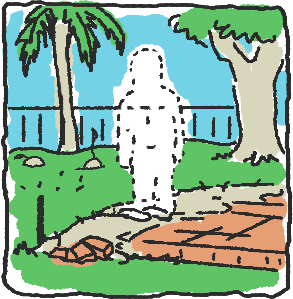 He was dead. The backyard was overgrown. The palm trees had dropped their coconuts, leaving them to sprout helpless in the tall grass. We texted and our other neighbors texted, but there was no answer. My next door neighbor was gone. Extending from the back door of his house to the center of the backyard was an unfinished brick patio, capped by a pile of sand and scattered bricks. It will probably never be finished. I looked at the pile of sand, with tufts of grass peeking through. There, atop the matted down hill were light impressions, the spot where my neighbor had stood, speaking loudly on his phone in a clear Colombian Spanish, mere weeks before. He will never again stand in his backyard. He will never again wave to me, and ask in his best English, “How you are, Jon?” Now his life, for me, is just a light impression in the sand of an unfinished patio project. The darkness of death has overtaken his house, and his wife is a dark-clad ghost who cannot bear to face her neighbors—maybe out of fear or deep grief, or both.
He was dead. The backyard was overgrown. The palm trees had dropped their coconuts, leaving them to sprout helpless in the tall grass. We texted and our other neighbors texted, but there was no answer. My next door neighbor was gone. Extending from the back door of his house to the center of the backyard was an unfinished brick patio, capped by a pile of sand and scattered bricks. It will probably never be finished. I looked at the pile of sand, with tufts of grass peeking through. There, atop the matted down hill were light impressions, the spot where my neighbor had stood, speaking loudly on his phone in a clear Colombian Spanish, mere weeks before. He will never again stand in his backyard. He will never again wave to me, and ask in his best English, “How you are, Jon?” Now his life, for me, is just a light impression in the sand of an unfinished patio project. The darkness of death has overtaken his house, and his wife is a dark-clad ghost who cannot bear to face her neighbors—maybe out of fear or deep grief, or both.
But that pile of sand and bricks in the backyard spoke to me, as I looked out one day. Those shallow impressions of footprints, now dappled with marks from raindrops, grassroots, and leaves, brought tears to my eyes. As I grieved the emptiness and lostness, the sappy sentimentality of “Footprints in The Sand” came to my mind. And again, I rekindled my disdain for the poem. That poem has always bothered me. Maybe you’ve read it before. The author dreams of walking with Jesus along a shoreline and looking back on life. Somehow the life being looked back on is the same shore, or something like that. I don’t know, the metaphor is a little confused and contrived. Anyway, two sets of footprints line the shore of each part of the life being examined. The poem ends with the author noticing that only one set of footprints mark the most difficult and dark times of life. The author poses a question to Jesus, something like, “Why weren’t you there in those dark times?” And then Jesus answers along the lines of, “That’s when I carried you.”
Touching, right? But let me briefly explain why it bothers me to my core. I cannot stand the sappy delivery, the congenial Jesus that seems to have time to explain to little ol’ me exactly what was going on in the “bad times.” Consider the implications of such a forced and confused metaphor. The whole setup seems to imply an end-of-life situation, right? Like the author is looking back on a life that was lived, looking for answers. I suppose most people reading the poem are touched by the way Jesus reveals his presence in the darkness, but that is the part that bothers me the most. Am I just waiting for a moment that will reveal to me that my struggles here all meant something? Let me put it another way, is my idea of “God” and “Christ” some sort of comforting explanatory tool, or the hope of a mere explanation, for what ails me? Even more to-the-point: do I worship an eventual explanation for my pain, or do I worship Christ? And what does that mean?
The Monster of a Denialist Christ
 Do I really think once this is all said and done I’m going to be sat in a room and Jesus will enter, dim the lights, pull out a projector (probably one of those old reel to reel ones) and play back all the horrendous things that happened to me? What would he say? If we’re keeping in line with the poem, he would say something like, “See, look, right there behind that tree, I was actually hiding back there while you were writhing in pain, drowning in an existential hell.” Or to my neighbor he’d say, “I was right there behind the curtain as you slowly suffocated in a hospital bed, where your family couldn’t even have a funeral after you were eventually gone.” Oh yeah, that’s really comforting. But is that the kind of Christ I’m after? Is that the kind of Christ I want to “grow in likeness” of?
Do I really think once this is all said and done I’m going to be sat in a room and Jesus will enter, dim the lights, pull out a projector (probably one of those old reel to reel ones) and play back all the horrendous things that happened to me? What would he say? If we’re keeping in line with the poem, he would say something like, “See, look, right there behind that tree, I was actually hiding back there while you were writhing in pain, drowning in an existential hell.” Or to my neighbor he’d say, “I was right there behind the curtain as you slowly suffocated in a hospital bed, where your family couldn’t even have a funeral after you were eventually gone.” Oh yeah, that’s really comforting. But is that the kind of Christ I’m after? Is that the kind of Christ I want to “grow in likeness” of?
This poem seems to be implying a Christ that is only there to take me away from the difficulties of life, nothing more. And he does so to the detriment of my growth and maturation. This poem is a representation of the collective view of a congenial Christ who actually becomes a stifling and oppressive monster. And the notion of a Christ whose only job is to “carry” me in the dark times, and then passively walk next to me in the good times, is an incoherent Christ. It’s a reduction of what Jesus did, and what his life and work represent in every way. It’s worshiping the idea of “restoration,” “redemption,” or “healing” and not the restorer, redeemer, and healer. It demands all the benefits for me and nothing from me. No need for me to be Christ to others, no need for me to grow in likeness, or live in self-giving love.
This version of Christ takes me out of the here-and-now, denies reality, and it doesn’t allow grief. In fact, it fights at all cost against grief, which—when faced fully—is the red line on the horizon at dawn, calling me toward a greater future, God’s future. The ability to lament is buried and lost. No, this Christ is exactly like an oppressive monster because it demands that I live in a fictional world where pain and suffering have no significance or value other than to be suppressed and avoided. This type of Christ devalues human experience, and as such is an inhuman fiction adopted as the collective view of “Jesus” from a people who think that the only point of life is to be comfortable and at ease.
This Christ is a monster that forces me into the delusion and petulance of a person who has never grown, and has rooted themselves in perpetual self-serving immaturity. This “footprints in the sand” Jesus is one who cannot let a life be an unfinished patio, a pile of sand with a single pair of fading footprints. It is the worst kind of fiction, because it refuses to acknowledge darkness and death as part of God’s plan—as part of what can actually form me into a more Christ-like human being. No, this Jesus is just here to take the bad things away. But reality is something far more ragged and violent than a feel-good savior can fix. It’s like offering a Band-Aid for a metastasizing tumor. Or like offering an inhaler to someone who has lost all lung function from the damage caused by a novel coronavirus. But, no, that’s too much! I want to reduce it to a simple thing, I don’t want to face the ragged edges of reality. But if I actually claim Christ, it is precisely these dark, broken things I can look directly at. I can face the reality of death.
Revising my Escapist Outlook
If I were to recover this poem from the abyss of self-obsessed escapism, and place myself in the poet’s point of view, there would need to be some changes. Instead of looking back on the shore and just seeing one life represented by footprints, I should begin to see how my life and especially my pain is a part of an interconnected web with all other life. My footprints line up with every other person who has ever walked this earth. I am part of the whole, messy, broken universe. But at the same time, I would notice the footprints lining the shore of my life were my lone prints the whole time. I would pose the question to Christ, “Where were you?” But he would stay silent. Then, when I turn to look at Jesus, instead of a smiling white European-looking man standing beside me, I would see a dark, rejected, broken man, hanging on a dark, crooked, and leafless tree. Silently Jesus’s eyes would turn to look and I would see all the pain of all of humanity—which I realized was connected to my own—being lived out and experienced by Jesus himself. No answer; no cute, comforting phrase. Just a life that was lived in self-giving, co-suffering love. Sharing in this darkness. A life offered, full stop.
I shed tears when I see the unfinished patio in the backyard of my next door neighbor. I shed tears for all of us who are in this deep well of suffering we call life. And my tears are an addition to the indents on the shifting sands, interspersed by the bricks that were intended to be built out into something “useful.” Can death be useful, like we think of a life being useful? For all our intentions, even a fully “finished” patio is still desperately lacking. But on that same unfinished patio now dance birds and squirrels. They gather there because my next door neighbor’s wife eventually came back outside to hang a bird feeder, right next to the place where her husband would stand watching his grandson play in the sand of the unfinished patio. From brutal ends come darkness, yes, but also new life. But I absolutely cannot get to this new life by dismissing the grief. I must plunge into it, and cry and cry. And watch the footprints fade. Let days become months become years. But maybe one morning I will awake to watch the sunrise color the now smooth and grass-covered sand a deep red, and yes, think of what might have been but, more importantly, what will be.


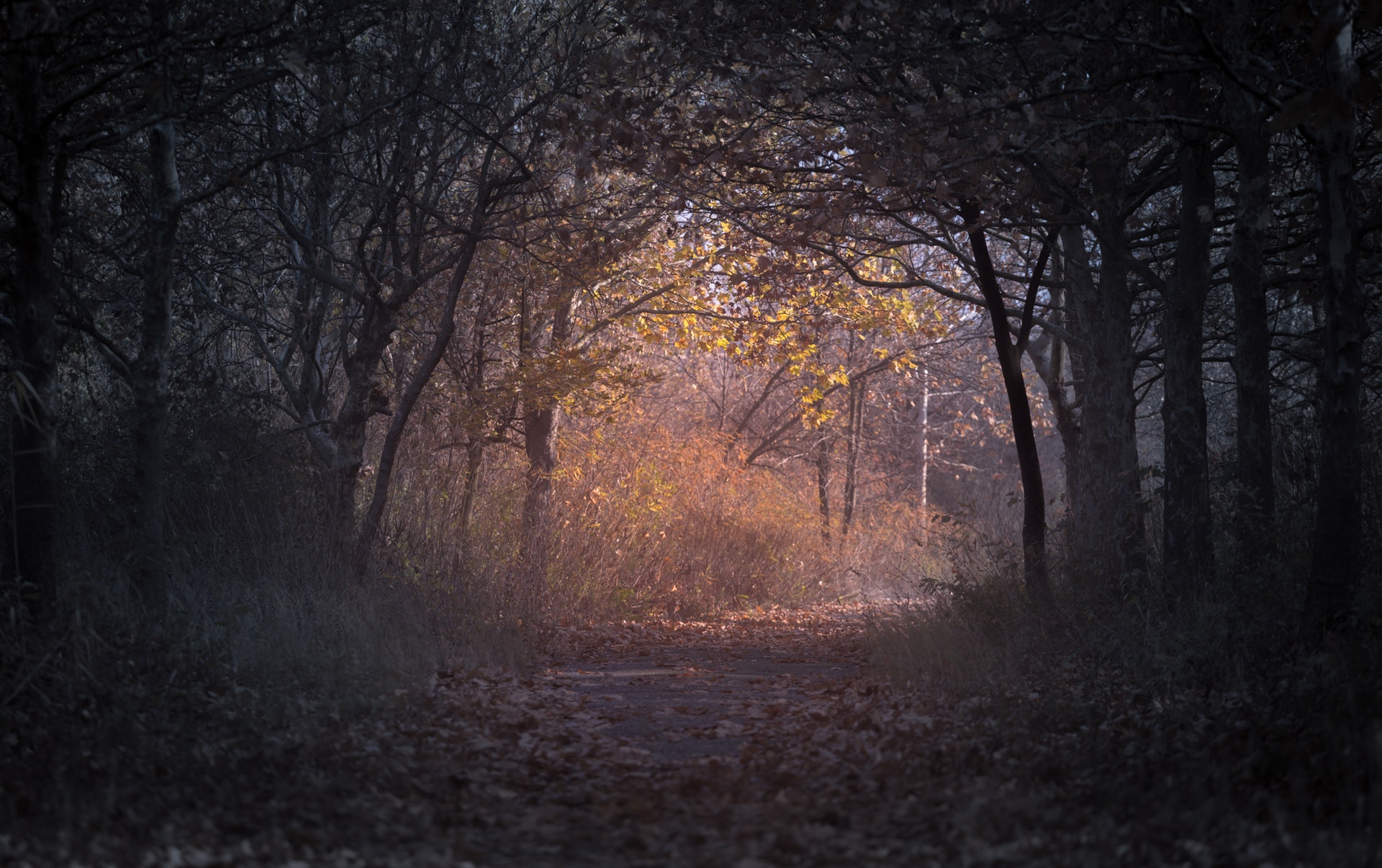


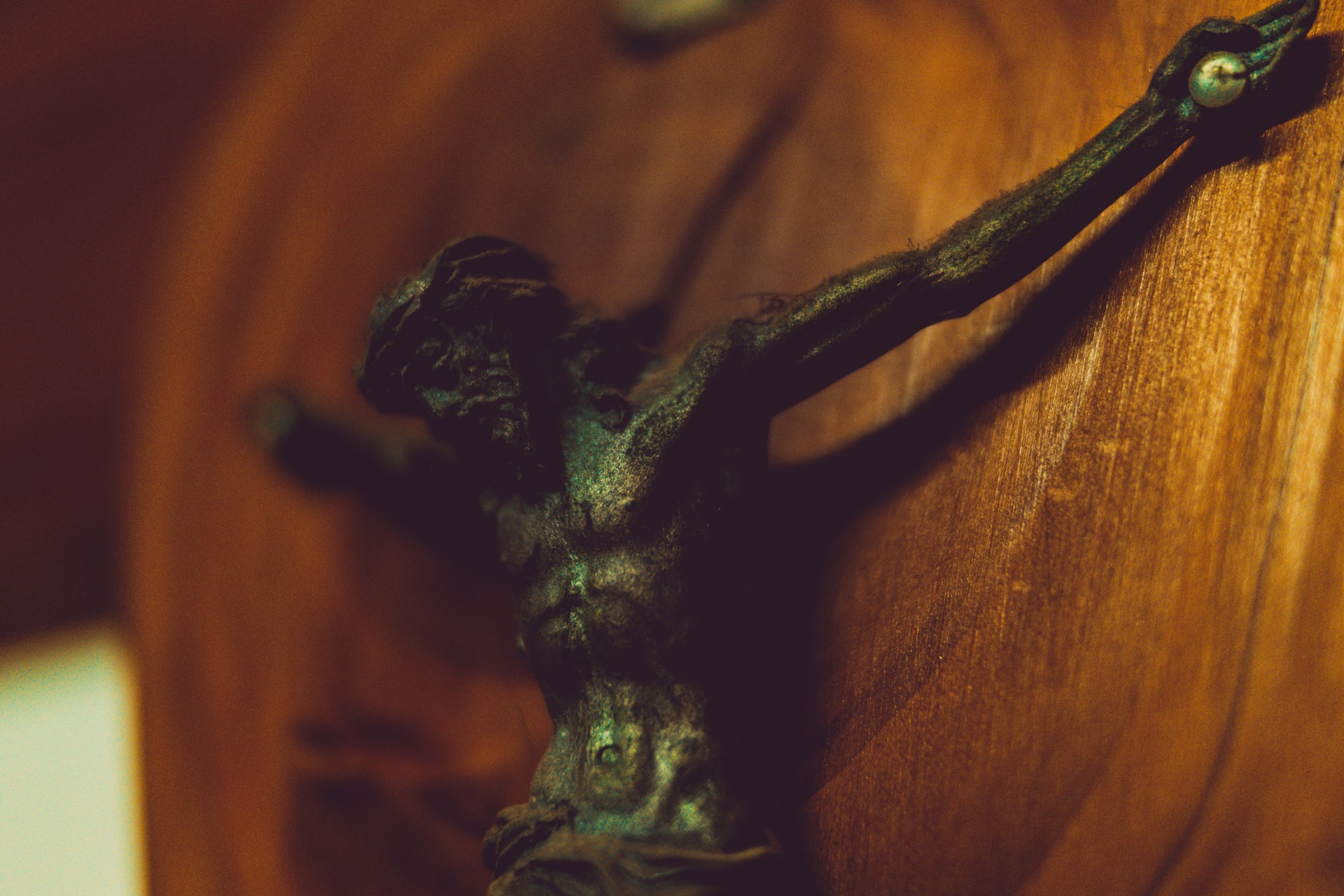
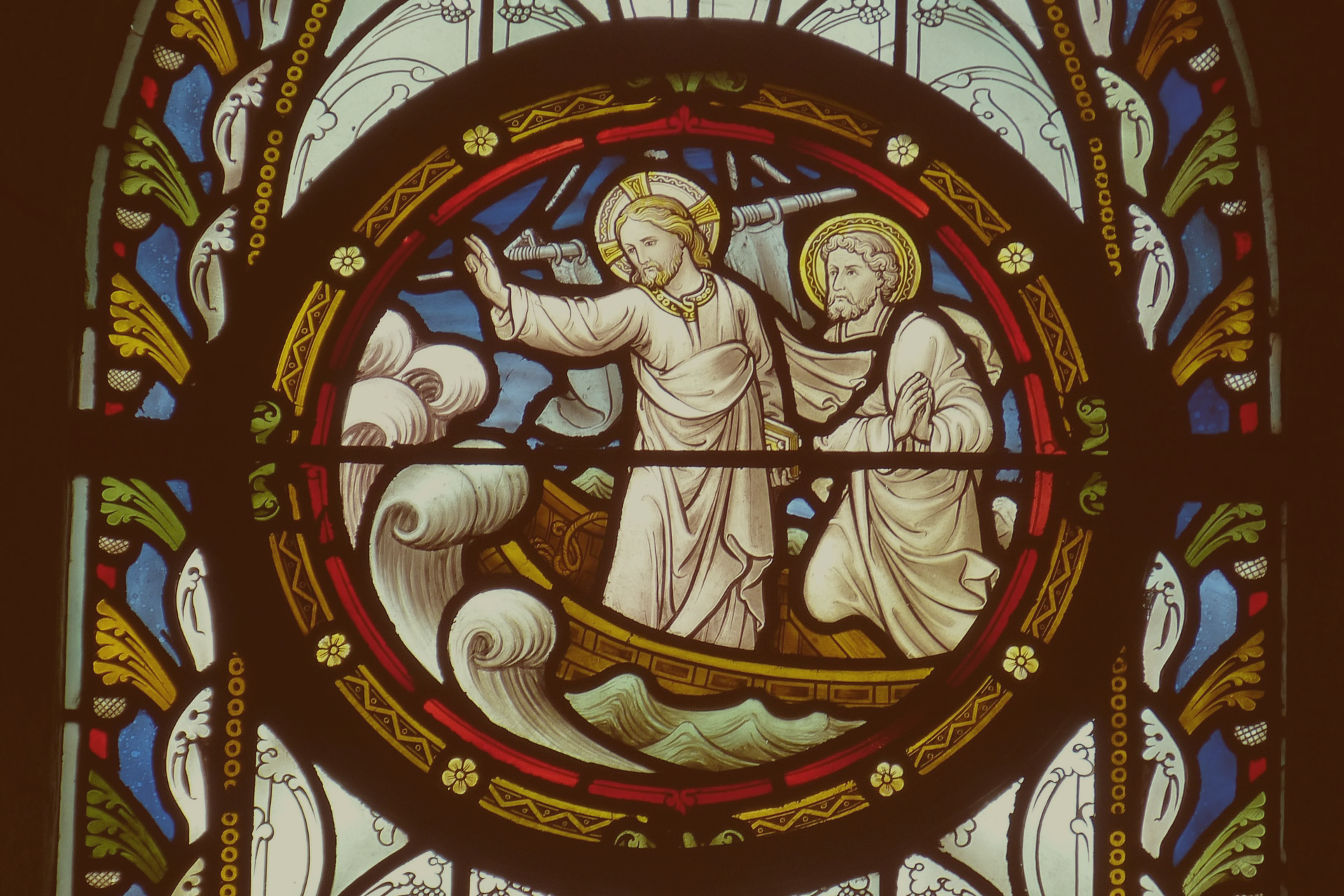
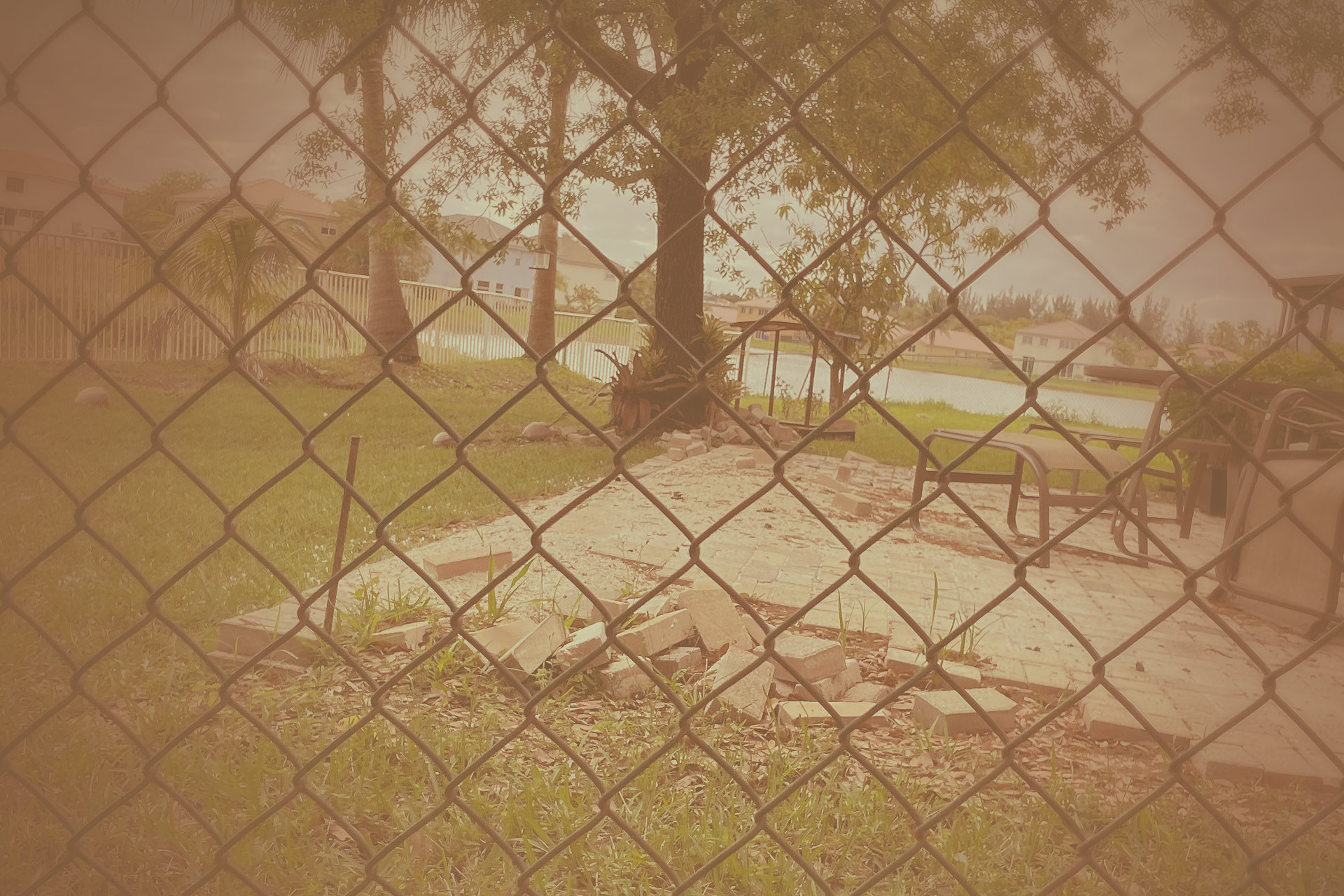
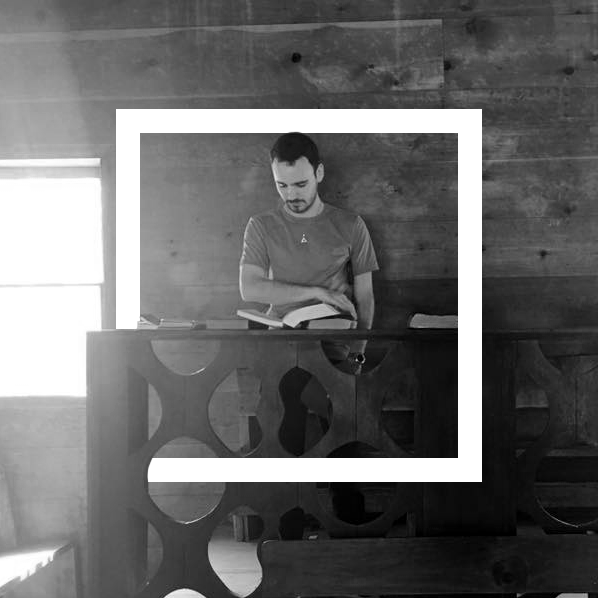
 In what hell have I steeped myself? Like a strong tea, with twisting and turning leaves bleeding out underwater, in heat above the boiling point. The truth is, I seem to be in the process of taking the scalding dip. And I’ve seen where it ends. It is a submersion that will one day find me dressed in an orange jumpsuit, known only by a cold number, which means I’m not really known but cataloged, herded, caged. A submersion that will find me staring down one of the members of my cell block, who has punched me in the mouth for no reason other than the frustration and existential furnace of the hell we both find ourselves. Hell, I mean, as exactly what hell is: a wasteland of the self. Isolation within ourselves – sharp loneliness and rattling emptiness, forever.
In what hell have I steeped myself? Like a strong tea, with twisting and turning leaves bleeding out underwater, in heat above the boiling point. The truth is, I seem to be in the process of taking the scalding dip. And I’ve seen where it ends. It is a submersion that will one day find me dressed in an orange jumpsuit, known only by a cold number, which means I’m not really known but cataloged, herded, caged. A submersion that will find me staring down one of the members of my cell block, who has punched me in the mouth for no reason other than the frustration and existential furnace of the hell we both find ourselves. Hell, I mean, as exactly what hell is: a wasteland of the self. Isolation within ourselves – sharp loneliness and rattling emptiness, forever. The crickets chirruped in an endless dirge outside the window. And I stared up at the ceiling. At the intensity of my stare the cedar paneling above gave way, and each chip of wood burst into dazzling white and became a solar system. Billions of burning, spinning, empty nothings stretched vast above me. The vastness of the cedar expanse spoke like music to the vastness of the expanse within me.
The crickets chirruped in an endless dirge outside the window. And I stared up at the ceiling. At the intensity of my stare the cedar paneling above gave way, and each chip of wood burst into dazzling white and became a solar system. Billions of burning, spinning, empty nothings stretched vast above me. The vastness of the cedar expanse spoke like music to the vastness of the expanse within me.
 He was dead. The backyard was overgrown. The palm trees had dropped their coconuts, leaving them to sprout helpless in the tall grass. We texted and our other neighbors texted, but there was no answer. My next door neighbor was gone. Extending from the back door of his house to the center of the backyard was an unfinished brick patio, capped by a pile of sand and scattered bricks. It will probably never be finished. I looked at the pile of sand, with tufts of grass peeking through. There, atop the matted down hill were light impressions, the spot where my neighbor had stood, speaking loudly on his phone in a clear Colombian Spanish, mere weeks before. He will never again stand in his backyard. He will never again wave to me, and ask in his best English, “How you are, Jon?” Now his life, for me, is just a light impression in the sand of an unfinished patio project. The darkness of death has overtaken his house, and his wife is a dark-clad ghost who cannot bear to face her neighbors—maybe out of fear or deep grief, or both.
He was dead. The backyard was overgrown. The palm trees had dropped their coconuts, leaving them to sprout helpless in the tall grass. We texted and our other neighbors texted, but there was no answer. My next door neighbor was gone. Extending from the back door of his house to the center of the backyard was an unfinished brick patio, capped by a pile of sand and scattered bricks. It will probably never be finished. I looked at the pile of sand, with tufts of grass peeking through. There, atop the matted down hill were light impressions, the spot where my neighbor had stood, speaking loudly on his phone in a clear Colombian Spanish, mere weeks before. He will never again stand in his backyard. He will never again wave to me, and ask in his best English, “How you are, Jon?” Now his life, for me, is just a light impression in the sand of an unfinished patio project. The darkness of death has overtaken his house, and his wife is a dark-clad ghost who cannot bear to face her neighbors—maybe out of fear or deep grief, or both. Do I really think once this is all said and done I’m going to be sat in a room and Jesus will enter, dim the lights, pull out a projector (probably one of those old reel to reel ones) and play back all the horrendous things that happened to me? What would he say? If we’re keeping in line with the poem, he would say something like, “See, look, right there behind that tree, I was actually hiding back there while you were writhing in pain, drowning in an existential hell.” Or to my neighbor he’d say, “I was right there behind the curtain as you slowly suffocated in a hospital bed, where your family couldn’t even have a funeral after you were eventually gone.” Oh yeah, that’s really comforting. But is that the kind of Christ I’m after? Is that the kind of Christ I want to “grow in likeness” of?
Do I really think once this is all said and done I’m going to be sat in a room and Jesus will enter, dim the lights, pull out a projector (probably one of those old reel to reel ones) and play back all the horrendous things that happened to me? What would he say? If we’re keeping in line with the poem, he would say something like, “See, look, right there behind that tree, I was actually hiding back there while you were writhing in pain, drowning in an existential hell.” Or to my neighbor he’d say, “I was right there behind the curtain as you slowly suffocated in a hospital bed, where your family couldn’t even have a funeral after you were eventually gone.” Oh yeah, that’s really comforting. But is that the kind of Christ I’m after? Is that the kind of Christ I want to “grow in likeness” of?